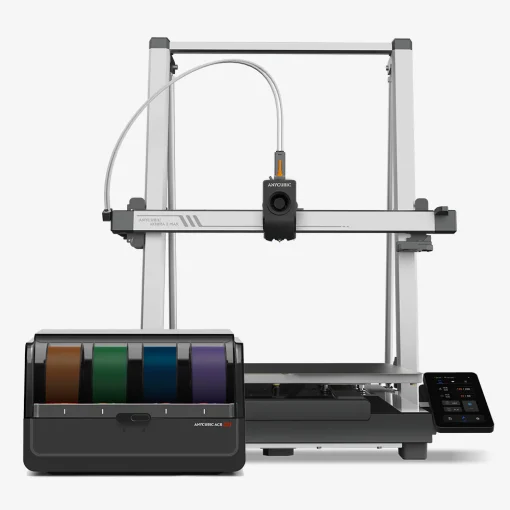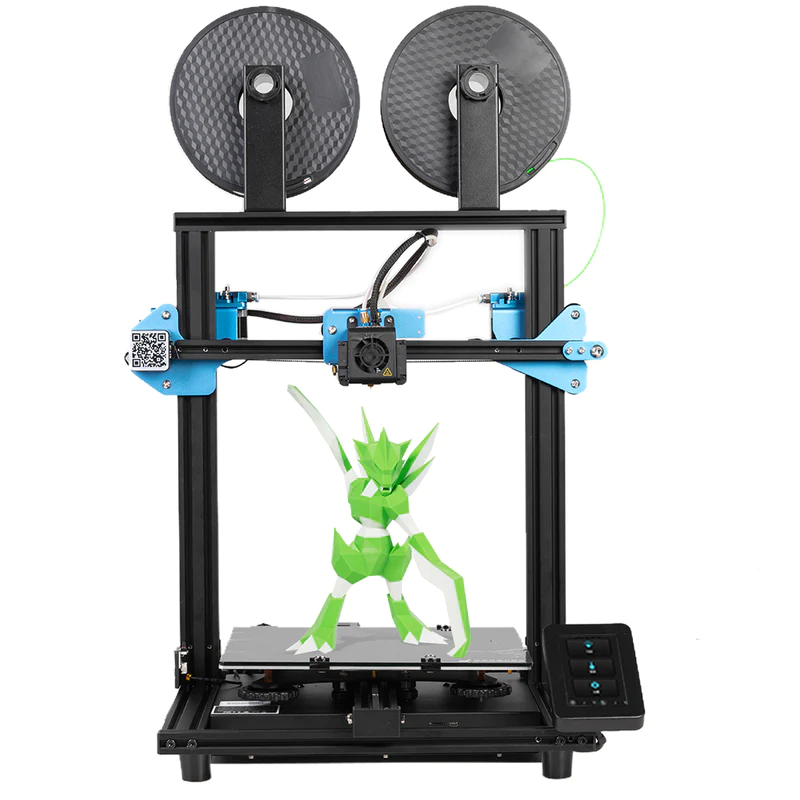Compare Kobra 3 Max Combo vs SV02
Comparison between the best 3D printers
Choose the best 3D printer at the best price. The cheapest 3D printers are here.
Buy a 3D printer here with 3D Fila.
 |
 |
|
| Model | Kobra 3 Max Combo |
SV02 |
| Printing Material | Filament | Filament |
| Buy Filament for Anycubic Kobra 3 Max Combo | Buy Filament forSovol SV02 | |
| Estimated price | $699,00 | $209,00 |
| Manufacturer | Anycubic | Sovol |
| Release Year | 2025 | 2020 |
| Print Volume [mm] | 420x420x500 | 280x240x300 |
| Printer Size [mm] | 640x753x706 | 539x493x710 |
| Weight [kg] | 23,6 | 11,86 |
| Power Loss Recovery | YES | YES |
| Enclosed printer | NO | NO |
| Bed Leveling | Automatic | Manual |
| Filament End Sensor | YES | NO |
| Bed type | Heated | Heated |
| Power supply system | Bowden | Bowden |
| Standard nozzle | 0,4 | 0,4 |
| Maximum Nozzle Temperature [°C] | 300 | 260 |
| Maximum Bed Temperature [°C] | 90 | 110 |
| Maximum printing speed [mm/s] | 600 | 120 |
| Filament holder | YES | YES |
| Camera for supervision | YES | YES |
| Recommended filaments | PLA, PETG, TPU | PLA, PETG, Tritan, Flex, ABS |
| Recommended slicers | Anycubic Slicer, Cura, Orca Slicer | Cura, Simplify, Slic3r, IdeaMaker |
| Maximum Resolution [mm] | 0,01 | 0,1 |
| Processor | ||
| Display | Touchscreen 4,3'' | Display touchscreen 4,3'' |
| Power Supply | 800 W | |
| Connectivity | USB, Wifi | SD / USB |
| Operating systems | Windows, Mac, Linux | Windows, Mac, Linux |
| Date of registration in the system | 2025-03-06 | 2022-11-10 |
| Release date | 2025 | 2020 |
| Extra features | The Anycubic Kobra 3 Max Combo combines high-speed and multicolor printing with up to 8 colors. It features automatic leveling, quick filament switching, clog and entanglement detection, and AI to prevent print failures. Its 800W hotbed heats up quickly, while 10,000mm/s² acceleration ensures efficiency. App and Wi-Fi control, print recovery, and video monitoring enhance the user experience. | The Sovol SV02 is a dual extrusion 3D printer with two inputs and one output hotend, silent motherboard and 4.3" color touchscreen. It includes a tempered glass platform for glue-free adhesion, dual Z-axis for more stability, and fast heating with Mean Well power supply. It has a resume printing function and support for upgrades, such as an automatic leveling sensor. |
| Support for multiple colors and materials (AMS and CFS) | YES | NO |
Notes * |
||
| Cost-benefit | 7 / 10 | 7 / 10 |
| Hardware | 5.4 / 10 | 1.5 / 10 |
| Tela | . | . |
| Print volume | 4 / 10 | 4 / 10 |
| Performance | 5 / 10 | 1 / 10 |
Conclusion |
| In comparing the Anycubic Kobra 3 Max Combo and the Sovol SV02, several factors emerge that highlight the strengths and weaknesses of each model, helping to determine the best option depending on user needs and budget. The Anycubic Kobra 3 Max Combo stands out with its larger print volume, advanced features like automatic bed leveling, and the capability for high-speed and multi-color printing. It also boasts a higher maximum nozzle temperature and enhanced design elements such as quick filament switching and AI-based error detection, making it suitable for more complex projects and diverse materials. Additionally, it offers better connectivity options, including Wi-Fi and USB, which can be convenient for modern users. On the other hand, the Sovol SV02 is a more budget-friendly option that still provides good capabilities for filament printing. Although it has a smaller print volume and lacks features like automatic bed leveling and filament end sensors, it does include a reliable resume printing function and a stable dual Z-axis design. Its compatibility with a variety of filaments makes it versatile, and with a lower price point, it can appeal to hobbyists or those new to 3D printing. In conclusion, if investors are looking for a high-end, feature-rich printer with significant capabilities and larger build volume, the Anycubic Kobra 3 Max Combo is the ideal choice. Alternatively, for those on a tighter budget who require a dependable and functional printer for simpler tasks, the Sovol SV02 serves as a commendable option. Ultimately, the decision should be guided by specific use cases, budget considerations, and the importance of advanced features in the printing process. |

